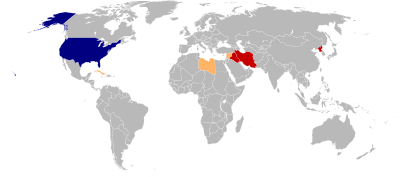"Rogue state" is a term applied by some international theorists to states that they consider threatening to the world's peace. These states meet certain criteria, such as being ruled by authoritarian or totalitarian governments that severely restrict human rights, sponsoring terrorism, or seeking to proliferate weapons of mass destruction. The term is used most by the United States ; in his speech at the United Nations (UN) in 2017, U.S. President Donald Trump reiterated this phrase. U.S. politicians have used the term to describe countries such as Iran, Syria, North Korea, Afghanistan, Cuba and Venezuela. The term has been applied by other countries as well.
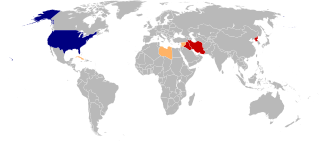
The phrase "axis of evil" was first used by U.S. President George W. Bush and originally referred to Iran, Iraq, and North Korea. It was used in Bush's State of the Union address on January 29, 2002, less than five months after the 9/11 attacks and almost a year before the 2003 invasion of Iraq, and often repeated throughout his presidency. He used it to describe foreign governments that, during his administration, allegedly sponsored terrorism and sought weapons of mass destruction.

"State Sponsors of Terrorism" is a designation applied to countries that are alleged to have "repeatedly provided support for acts of international terrorism" per the United States Department of State. Inclusion on the list enables the United States government to impose four main types of unilateral sanctions: a restriction of foreign aid, a ban on weapons sales, heightened control over the export of dual-use equipment, and other miscellaneous economic sanctions. The State Department is required to maintain the list under section 1754(c) of the National Defense Authorization Act for Fiscal Year 2019, section 40 of the Arms Export Control Act, and section 620A of the Foreign Assistance Act.

The 2003 State of the Union Address was given by the 43rd president of the United States, George W. Bush, on January 28, 2003, at 9:00 p.m. EST, in the chamber of the United States House of Representatives to the 108th United States Congress. It was Bush's second State of the Union Address and his third speech to a joint session of the United States Congress. Presiding over this joint session was the House speaker, Dennis Hastert, accompanied by Dick Cheney, the vice president, in his capacity as the president of the Senate.
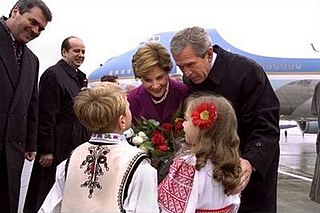
The main event by far shaping the foreign policy of the United States during the presidency of George W. Bush (2001–2009) was the 9/11 terrorist attacks against the United States on September 11, 2001, and the subsequent war on terror. There was massive domestic and international support for destroying the attackers. With UN approval, US and NATO forces quickly invaded the attackers' base in Afghanistan and drove them out and the Taliban government that harbored them. It was the start of a 20-year quagmire that finally ended in failure with the withdrawal of United States troops from Afghanistan.
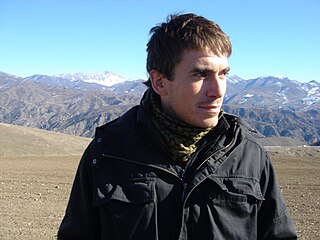
Holidays in the Danger Zone: Places That Don't Exist is a five-part travel documentary, part of the Holidays in the Danger Zone series, produced and broadcast by BBC This World. Written and presented by Simon Reeve, and produced by Will Daws and Iain Overton. It was first broadcast in May 2005, on BBC Two.

Holidays in the Danger Zone is a series of documentaries, produced by the BBC This World and originally broadcast on BBC Four in the UK. They have also been shown on BBC Two and exported to other countries, including Canada and Australia.
Holidays in the Danger Zone: America Was Here is a four-part travel documentary on Central America and Southeast Asia, part of the Holidays in the Danger Zone series, produced and broadcast by BBC This World. Written and presented by Ben Anderson, and produced by Will Daws. It was first broadcast in Jun 2007, on BBC Four.

The 2002 State of the Union Address was given by the 43rd president of the United States, George W. Bush, on January 29, 2002, at 9:00 p.m. EST, in the chamber of the United States House of Representatives to the 107th United States Congress. It was Bush's first State of the Union Address and his third speech to a joint session of the United States Congress. Presiding over this joint session was the House speaker, Dennis Hastert, accompanied by Dick Cheney, the vice president, in his capacity as the president of the Senate.

Lullabies from the Axis of Evil (2004) is an album collecting traditional lullabies sung by women from Iraq, Iran, and North Korea, as well as Syria, Libya, and Cuba, plus Afghanistan and Palestine, mixed with Western performers singing translated versions of the songs.
Ben Anderson is a British journalist, war correspondent, television reporter, and writer. He is particularly known for his coverage of the 2001–2021 War in Afghanistan, including the films This Is What Winning Looks Like, The Battle for Marjah, and Mission Accomplished? The Secret of Helmand. He has reported on numerous other controversial locations, including North Korea, Iran, and Guantanamo Bay. He has received awards for his work, including an Emmy in 2016 and the Foreign Press Award.

Literature from the "Axis of Evil" is an anthology of short stories, poems and excerpts from novels by twenty writers from seven countries, translated into English, and published by Words Without Borders in 2006.

The term Obama Doctrine is frequently used to describe the principles of US foreign policy under the Obama administration (2009–2017). He relied chiefly on his two highly experienced Secretaries of State—Hillary Clinton (2009–2013) and John Kerry (2013–2017)—and Vice President Joe Biden.
The Barack Obama administration's involvement in the Middle East was greatly varied between the region's various countries. Some nations, such as Libya and Syria, were the subject of offensive action at the hands of the Obama administration, while nations such as Bahrain and Saudi Arabia received arms deliveries. Notable achievements of the administration include inhibiting the Iranian nuclear program, while his handling of certain situations, such as the Syrian civil war, were highly criticized.
Holidays in the Danger Zone: Meet the Stans is a four-part travel documentary on Central Asia, part of the Holidays in the Danger Zone series, produced and broadcast by BBC Correspondent. Written and presented by Simon Reeve, It was first broadcast from 3–6 November 2003, on BBC Two, and internationally during 2004 and 2005.
The Axis of Resistance is an informal anti-Israeli and anti-Western political and military coalition led by the Iranian government. It includes the Syrian Arab Republic, Lebanese Shia militant group Hezbollah and various militant groups in Palestine.

Mahsa Vahdat is a Persian classical and world music vocalist.
Holidays in the Danger Zone: Violent Coast is a four-part travel documentary on West Africa, part of the Holidays in the Danger Zone series, produced and broadcast by BBC This World. Written and presented by Ben Anderson, It was first broadcast on BBC Four, before being repeated on BBC Two between 21–24 June 2004, and internationally during 2004 and 2005.
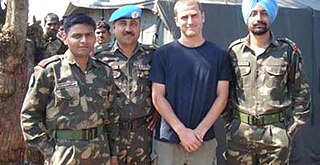
Holidays in the Danger Zone: Rivers is a five-part travel documentary on dangerous rivers, part of the Holidays in the Danger Zone series, produced and broadcast by BBC This World. Written and presented by Ben Anderson, and produced by Will Daws. It was first broadcast between 21 February - 7 March 2006, on BBC Two.

Iraq–North Korea relations are relations between North Korea and Iraq. The two states are part of what is called the "Axis of Evil", countries presented by the George W. Bush administration as wishing to obtain weapons of mass destruction and supporting terrorism, along with Iran. Iraq was removed from the U.S. State Sponsors of Terrorism list in 2004.
